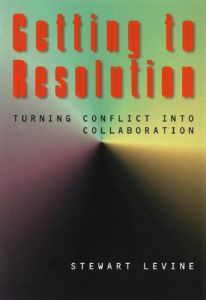Join getAbstract to access the summary!

Join getAbstract to access the summary!
Stewart Levine
Getting to Resolution
Turning Conflict Into Collaboration
Berrett-Koehler, 1998
What's inside?
How to take the high road to conflict resolution, by mediating instead of litigating. Virtually all the suburbanites in the global village will enjoy this suggested substitute for 900 years of civil law.
Recommendation
Reluctant attorney Stewart Levine provides a rational framework to justify spending his life avoiding conflict and confrontation. Even in the business world, he takes a pass on legal action and other logical ways of fighting back in a conflict. Instead, when opinions differ and arguments flourish, he seeks a higher course of reconciliation and collaboration. His seven-step resolution process saves time and money, launders egos, and advances clarity. Although each chapter is summed up almost too tidily in a final paragraph, or even a final sentence, Levine does not stint. In each chapter, he shares real world examples from his life and career. getAbstract recommends this book to anyone who wants to rationalize a business deal based solely on trust, to anyone searching for a deal-making scenario where lawyers are not invited, and to people who are looking for the words to express their desire to just get along.
Summary
About the Author
Stewart Levine is the founder of ResolutionWorks, a company that provides workshops, consulting, and motivational materials to change the way conflict is resolved. His clients have included American Express, Caterpillar Corporation, Chevron, General Motors, and Oracle. He is an attorney and a graduate of the Maxwell School of Economics at Syracuse University.
















Comment on this summary